- Home
- Andrew McGahan
Treasures of the Deep Page 2
Treasures of the Deep Read online
Page 2
As for her fearsome reputation – the truth was, she was not at all the terror that rumour made her out to be. At least, she was a terror only to fools and braggarts, examples of which she encountered all too often (she felt) among the young noblemen who tried to court her.
She had no patience for them. Short as she was, the Lady Esmerelda looked up at all these towering and proud young men and saw only lumbering oafs, too slow and stupid to bear – let alone marry. So to be rid of them, she often let her quick tongue cut them down to size, surprised at how easy it was to prick male pride, and at how helpless they were to defend themselves.
More years passed; the Lady Esmeralda turned eighteen, then twenty-one, then twenty-five – and still she was unwed. She was not opposed to marriage, at least in principle, but meanwhile her life was very satisfying without it. She had the freedom to do as she pleased, and was busy travelling all about Castille overseeing the construction of special hospitals for women in childbirth, a project she had begun in memory of her mother. It seemed that a husband would only interfere with that freedom, or take her off to some other kingdom, away from her work. So she could see little purpose in it.
Also, whenever she consulted her scapegoat – in whom she had great faith – about this suitor or that, he always advised against accepting them.
Faustus – though of course he could not tell the Lady Esmeralda this – had no desire to see his charge married to anyone at all. A new husband might well regard it as his own role to protect the princess, and so send the scapegoat away; at the least, Faustus knew his influence over the princess would lessen if she married.
But he knew too that he could not simply reject, without good reason, every suitor that approached her. So whenever the Lady Esmerelda asked Faustus about marriage, he always gave the same cunning reply. He pretended that a foretelling was upon him, and said that if she was to wed at all, then it would not be to fellow royalty or nobility, but to someone of lesser status.
But how could that be, the Lady Esmeralda would ask, for she would surely never be allowed to marry someone who wasn’t her equal? To which Faustus would respond, in cryptic fashion, that even so, if the right man ever came, he would, despite his lesser rank, indeed be her equal, and be able to meet her eye to eye. But even if such a one never came, the scapegoat would add, the Lady was not to worry. She did not need a husband. He insisted that, husband or not, hers was a name destined to live on through history.
The great reception for Commander Vincente took place in the Grand Salon of King Ferdinand’s palace at Coris. It was an important moment in the history of the two kingdoms, so long at loggerheads with one another. Many were hoping that such a cordial assembly might mark the start of a new era of friendship between the realms.
Ferdinand was certainly gracious enough when he met with Vincente in private, shortly before the reception was to begin. He praised the young commander for his chivalry, thanked him for rescuing the Prince, and congratulated him on winning the prize of the Vanquish. At which point came the only sour note of their meeting.
For Ferdinand said, ‘If I might make one suggestion, however, Commander. The Vanquish is an old ship, one of the oldest serving in our fleet – it was only by the whim of Captain Ramon, who was fond of it, that it was kept in service at all. So if Castille is to cede a ship to Valignano, as the rules of battle say we must, then I would be honoured if you would instead accept a more modern vessel, in better condition. Why, the Vanquish I gather is little better than a wreck now anyway. What do you say, Commander, shall we exchange it for a finer one?’
It was a request that rather perplexed Vincente. For Ferdinand spoke truly – the Vanquish was indeed an old ship, and in poor condition, more so after the battle, and it was generous and honourable to offer to replace it. And yet Vincente was hesitant. In the brief time that he’d spent aboard the Vanquish he’d felt a strong affinity for the old vessel. He liked it, and knew somehow that it had greatness ahead of it still, not retirement. The idea of surrendering it now cut him surprisingly deep.
More importantly, he suspected that Ferdinand was not a man to act from honour or generosity alone – there must be more to this offer than there appeared. And so, politely, Vincente rejected it, saying he felt bound to accept the prize as it had been won in the battle.
Ferdinand pressed no further, though he was clearly unhappy. It was time to go to the reception. And yet, as historians now know, Vincente’s instincts were quite correct; King Ferdinand indeed had ulterior motives behind his proposal. But what they were Vincente himself would never learn. That truth would only be unearthed by others, and not until many years later.
The reception was a brilliant affair; some three hundred of Castille’s highest-ranking courtiers and nobility gathered beneath the Grand Salon’s blazing chandeliers, their finery and jewels glittering magnificently in the thousand mirrors that graced the Salon’s walls.
Once everyone of importance was in attendance – including the Lady Esmeralda and her retinue – the royal heralds announced, ‘Your Majesty King Ferdinand, Crown Prince and Lady Princess, Lords and Ladies; please pay welcome to the most esteemed Commander Vincente of the Shinbone, and other honoured guests from the court of Valignano.’ At which, several hundred expectant faces turned as the Salon doors swung open and Commander Vincente and his party swept in.
The Lady Esmeralda found herself surprised. So this was the dashing young Commander Vincente of whom everyone was speaking. But he was so short! And worse, his hair was thinning, and he had a pot belly; even his finely tailored coat and commander’s hat couldn’t hide such things. She smiled to herself. Really, was this the best Valignano could produce for a hero?
But later in the evening, when her brother brought Vincente over in person to meet her, the Lady Esmerelda was forced to reassess her opinion. The commander first bowed low, as protocol demanded, but then – as her brother enthused about the details of his rescue – Vincente straightened to gaze at her directly, unabashed by her rank. Indeed, the half smile on his lips, while in no way arrogant or smug, appeared to dismiss her and the entire Court of Castille as an idle amusement at best.
What presence the man had – for up close he did not seem short, or pot-bellied, or balding. Up close she was aware far more of his eyes, dark and calm as they assessed her, exactly level with her own. Then there was that half smile of his, so knowing and assured. And finally there was his aura of authority – not the authority of royalty, of power by birth and privilege, such as her father displayed – but rather the authority of self-confidence and capability, the earned authority of a commander who has led his ship to victory. And his hands! She noticed suddenly, in a way that made her skin feel flushed, how strong his hands looked. How old did the reports say he was? Thirty-four, wasn’t it? Nearly ten years her senior …
The simple fact was, in those first few moments, before her brother even finished speaking, and before either she or Vincente could say a word to each other, the Lady Esmeralda fell in love.
Thus, when Carlos concluded by saying to Vincente, ‘And so it pleases me greatly to introduce you to my sister, the Lady Esmeralda Chloemena Despina, Princess of the Scale,’ an amazing thing happened. The woman who was a terror to all men smiled at the commander, held out her hand to be kissed (for she very much wanted to feel the strength of his hands) and to her own surprise said, laughingly, ‘Please, just call me Chloe.’
A family nickname which, until that moment, only her father and brother had ever been permitted to use.
On Vincente’s part the surprise was no less.
At his first glimpse of her, he took the princess to be what all rumour said she was – cold, aloof, forbidding. Then, as he stood waiting for her brother to finish, he observed her more closely, with the detachment of knowing they would probably never meet again.
She was not, he decided, particularly beautiful. She was short and rather pinched, and her expression was haughty – angry, perhaps, that his stare was so dir
ect. Which only made him smile, for why should he be intimidated merely by royalty? He was a man who had braved the Ice, and defied whales, and won battles at sea. Even a princess could hardly compare to that.
He was all the more shocked, then, when she suddenly laughed, and held out her hand to him, and in an instant threw all her high titles away.
Please, just call me Chloe.
Chloe! Why, the very sound of it changed everything about her. He took her hand in his, kissed it lightly, and staring up again saw something in her eyes that was as far from haughtiness as could be.
Vincente could never remember what he said next, only that he was smiling as he said it, and that she laughed again in return – and that when she laughed she suddenly was beautiful, at least to him.
And so they each fell.
Hovering nearby, however, was Faustus.
He watched with a deepening frown as Vincente and Chloe spent the rest of that evening together, first talking, and then dancing late into the night. This must not be allowed to progress too far, the scapegoat knew: but he felt trapped by his own false prophecy. A man who could meet her eye to eye. A man of lesser rank, but her equal. He’d never imagined one might actually appear! And by the time the reception ended, and Faustus could speak with the Lady in private, to caution her about involvement with the young commander, it was already too late.
Not that he was alone in his disapproval. The affair was a scandal from the beginning, and gossip of it passed all over Coris the next day, spread by the hundreds of eagle-eyed courtiers who had been packed into the Grand Salon. The cheek of it! A Valignano sailor of mere commander’s rank – not even a captain, and certainly not a nobleman – dallying with a Castille high princess!
King Ferdinand was certainly unimpressed, and the next evening came close to banishing Vincente back to Valignano. But Vincente had been invited to be a guest for a full month, and to rescind that invitation now would only cause another diplomatic incident.
Ferdinand would have risked it anyway, but the Crown Prince Carlos would not hear of his rescuer being insulted, even if the commander had indeed set his heart upon Carlos’ own sister. Why – Carlos told his father heatedly – Vincente was as fine a man as could be, and Chloe could hardly hope to do better. An attitude which only confirmed to Ferdinand that his son was a fool. A lowly Valignano officer would never do for Chloe.
Nevertheless, by the month’s end Vincente and Chloe were engaged. No amount of dire prophecies and dark hints on Faustus’ part could shake Chloe’s certainty. And no end of threats and admonishments on Ferdinand’s part could make his daughter see reason. Reluctantly, both scapegoat and king had to admit defeat and give their consent. Faustus was forced to make do with a promise from Chloe that he would not be sent away. And Ferdinand could only write to his fellow monarch, King Benefice of Valignano, suggesting that Vincente be ennobled with a knighthood, so that at least some protocols could be preserved.
Six months later Vincente and Chloe were wed – on the same day, as chance would have it, that far away across the sea in a small cottage in a high valley of New Island, a baby boy was born to the Amber family …
But that, of course, was an event unknown to the happy couple, and of no apparent importance to their future. The wedding feast was immense, and attended by the assembled courts of both kingdoms in great hope, for the union would surely put an end to the animosity between the two lands. With such ties to bind them – Valignano’s favourite son married into the Castille royal family – how could the realms stay enemies?
Alas, fate had other intentions.
For a time, however, it seemed that life for the new couple was blessed. After a year-long honeymoon tour of Great Island, which included a month upon the Twelfth Kingdom as guests of the Sea Lord, they returned to Haven Diaz, capital port of Valignano. There – enriched by a dowry from King Ferdinand, and ennobled as a knight by King Benefice – Vincente set up home with Chloe in a fine mansion overlooking the harbour.
But even before unpacking, Vincente took his new wife down to the docks to meet his equally new command. For as a further reward from King Benefice, Vincente had been promoted to the rank of Ship’s Captain, a title that mattered far more to him than his knighthood. The latter was an empty honour, bestowed for formality’s sake. But the captaincy he’d attained by skill and courage.
And fittingly, his first command was to be the very battleship he’d captured in the duel that had made him so renowned – the Vanquish.
It waited for him now in the shipyards, where the great work of restoration had just begun, for Vincente had ordered a complete refit of the vessel. The ship had been badly damaged in the battle, but also – as King Ferdinand had said – it was very old, and while the ancient hull was still sound within its sheath of nicre, the lower decks were in a poor state. Thus when Vincente and Chloe visited it that day, the vessel was a bare hulk without masts or decking – little more, in fact, than a hollowed-out shell. But already it was a thing of beauty to its captain.
His own ship! Staring down, Vincente could discern grace and speed even in the empty hull. Oh yes, he would make it a vessel fit to circle the world!
‘What will you name it?’ asked his wife. ‘The custom is the same here as in Castille, is it not? A captain is allowed to choose a new name for his first command?’
Vincente nodded. ‘The custom holds in Valignano too. But it’s not time for a new name yet. A captain must take his first voyage on his new ship under its old name, so as to get to know it – only then may he rechristen the vessel. So it will remain the Vanquish for now.’
‘Still, what name will you choose, when the time comes?’
‘I won’t know till then.’
She smiled. ‘Battleships always have such aggressive sounding names. Momentous. Vanquish. Conquest. They’re a little obvious, don’t you think? A little insecure? It seems to me that a confident captain wouldn’t need such a desperately belligerent name to advertise his martial qualities. He could pick something softer.’
Vincente laughed. ‘I don’t know that men would like to serve on a battleship called Satin or Feather.’
Chloe turned to her scapegoat, who was with them. ‘What should he name it, Faustus?’ she asked playfully. ‘Is it a lucky ship, do you think?’
Faustus considered her unhappily. He had not enjoyed the last year, dragged about the kingdoms on a honeymoon tour and consigned to a position that was little more than master of the baggage. He missed Castille and his place in the royal court, but of course he could not go back there, not without Chloe – and though she still was careful to consult him on all matters, he knew he would never convince her to leave her husband and go home.
His gaze bleak, he turned to examine the hollow hull. ‘It is a vessel that has known defeat,’ he said at last. ‘At Captain Vincente’s own hand, most recently, but in earlier years too, I feel. And yet I feel also that it has known many victories. It is neither lucky nor unlucky, I say. It is a ship that mirrors only the skills of its commander.’ He bowed to Vincente. ‘Name it as you see fit, sir.’
Vincente gave no response. He did not much like Faustus, if only because Faustus plainly did not much like him, or approve of the marriage. But beyond that, it seemed strange to Vincente that Chloe, who was otherwise so level-headed and sensible, consulted her scapegoat so regularly, and gave so much credence to his supposed intuitions and prophecies. Surely she didn’t believe in nonsensical things like the telling of the future …
Ah, but the old man had been with her most of her life, and Vincente had already assured her that he would never force her to send him away.
The refitting was scheduled to take a single year, but in fact the Vanquish was well over two years in the shipyards. Vincente bore the delays patiently, however, for he was busy with other matters.
First, shocking news came from Castille; Carlos the Crown Prince, Chloe’s brother, had died suddenly of a fever, leaving an infant son and daughter behind, and rend
ering Vincente’s rescue of him in vain.
It necessitated a visit of some months to Castille for the funeral and the official mourning. Not only had Chloe lost her brother and Vincente a friend, it would prove a significant death in state affairs too, for it left King Ferdinand without an adult heir, and ensured that he would rule Castille far into his embittered old age, with grave consequence to the Ship Kings empire.
And then came a greater distraction, for when Vincente and Chloe returned to Haven Diaz, Chloe announced that she was expectant with their first child. The birth came in due time – on the second anniversary of their wedding, no less – and produced a small but healthy baby boy. They named him Augustin Carlos of the Shinbone, and for a long while afterwards fatherhood was more than enough to keep Vincente occupied.
But the day finally arrived – with Augustin sixteen months old, and Vincente himself just turned thirty-seven – when the Vanquish was finished. Standing proudly at the wheel, the new captain eased his ship out from the dock for the first time, its new sails strung brightly from its new rigging. There followed a further three months of sea trials and training, but at last the vessel was fully squared away and the crew primed, ready to depart.
Their inaugural assignment? Escorting a tribute fleet on a spring run to the dominion of New Island.
‘It’s a dull enough crossing, and short too,’ Vincente told his wife after receiving his orders. ‘I would’ve preferred the Twin Isle’s run – the Vanquish used to make it often under Ramon – but it’s a start.’
‘How long will you be away?’
‘Oh – five or six months, I’d expect.’
‘You’ll miss Augustin’s second birthday!’

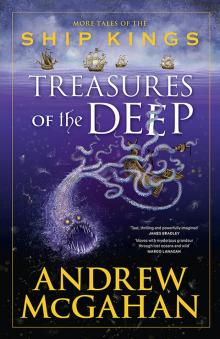 Treasures of the Deep
Treasures of the Deep The Rich Man’s House
The Rich Man’s House Praise
Praise The White Earth
The White Earth 1988
1988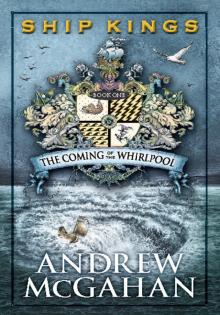 The Coming of the Whirlpool
The Coming of the Whirlpool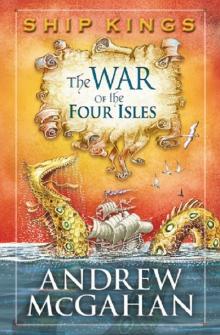 The War of the Four Isles
The War of the Four Isles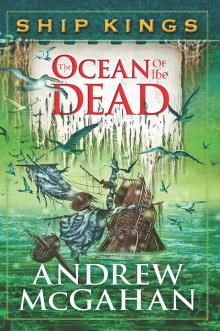 The Ocean of the Dead: Ship Kings 4
The Ocean of the Dead: Ship Kings 4 Last Drinks
Last Drinks Wonders of a Godless World
Wonders of a Godless World Underground
Underground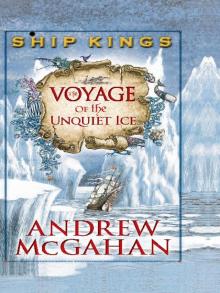 The Voyage of the Unquiet Ice
The Voyage of the Unquiet Ice